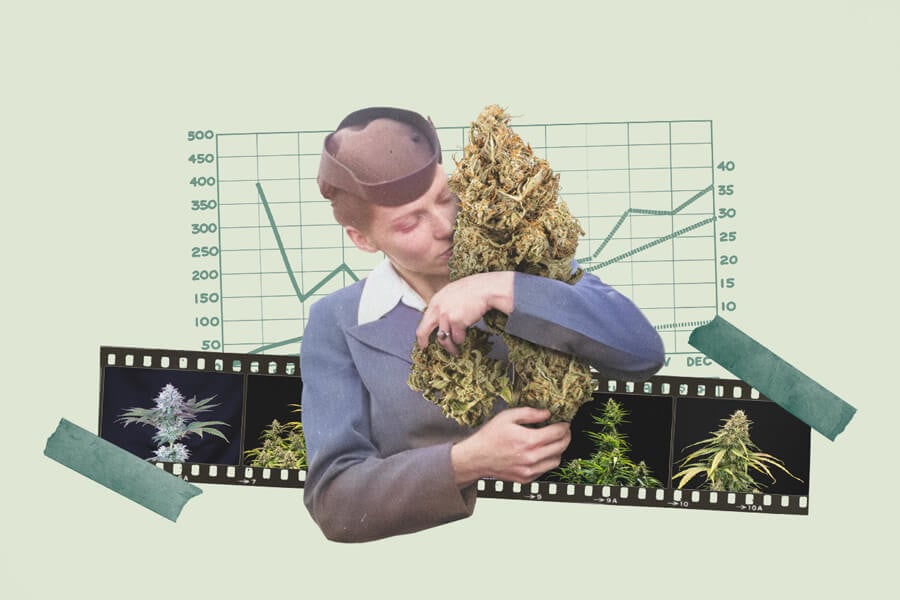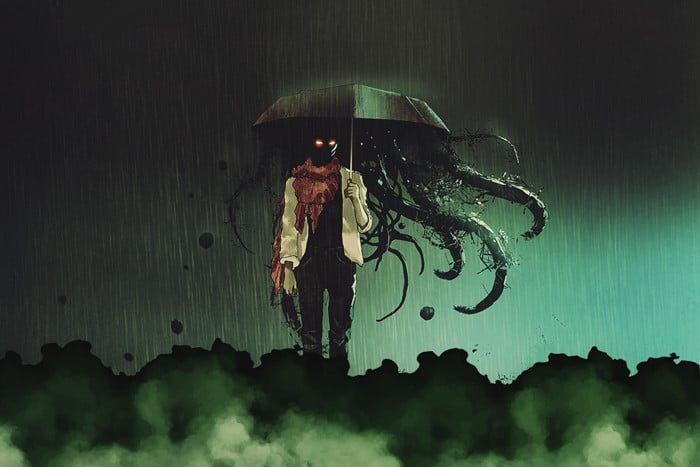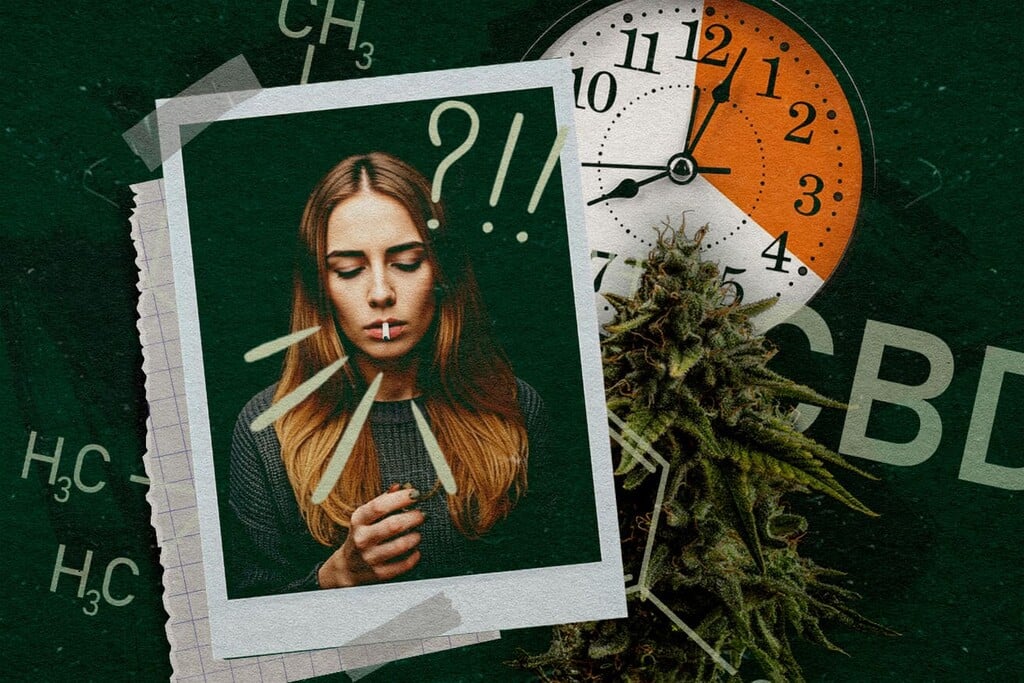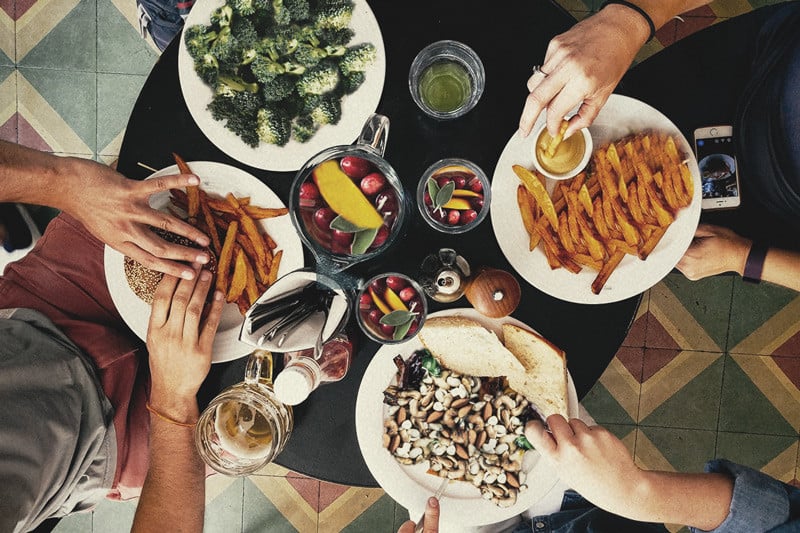.
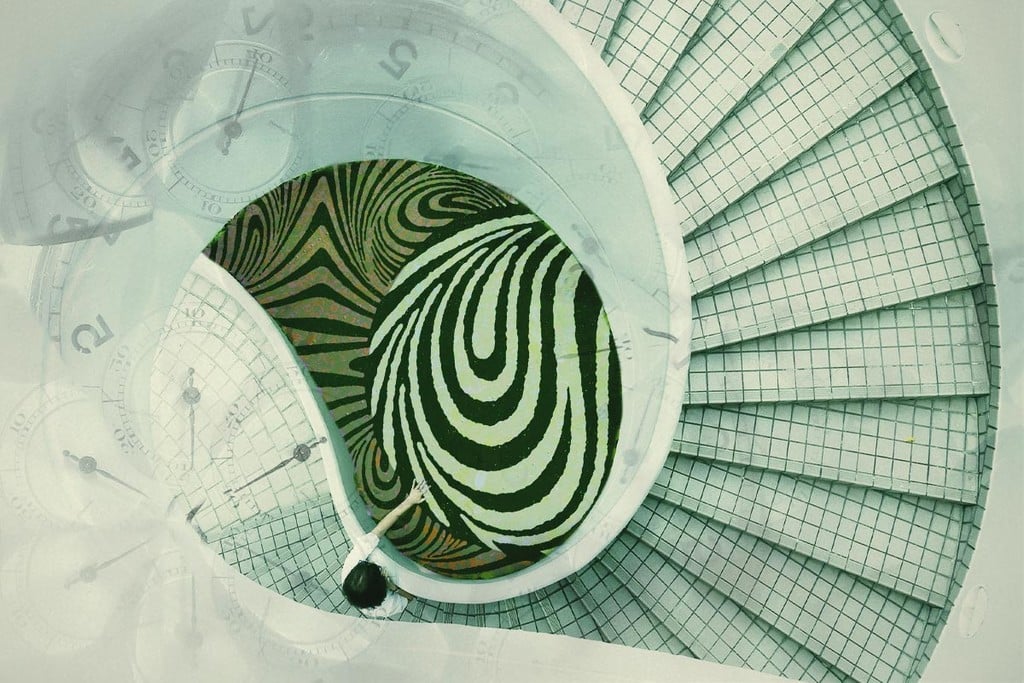
How Long Does A Cannabis High Last?
Are you looking to push the duration of your cannabis high to the maximum? Or maybe you want to discover ways reduce it? Find out how to alter the length of your high, and how different methods of consumption alter how long the psychoactive state lasts. You'll also learn how metabolism, weight, and even age can impact the effects of THC.
Many factors are involved when it comes to the intensity and duration of a cannabis high. The type of weed you consume and how you take it can greatly impact how long you'll feel the effects. Individual factors, including your weight and height, can also dictate the duration of your red eyes and deep thoughts.
Explore the primary factors that influence how long you'll stay high for below. You'll discover which methods will keep you stoned the longest and what you can do to cut a high short if you ever need to.
Contents:
What Factors Influence How Long a Weed High Lasts?
Sometimes smoking a joint delivers a fast-acting high that sends a jolt of inspiration through your body before dissipating. Other times, hitting a bowl might result in a high that creeps on overtime and lingers for hours.
Below, you'll learn about the key variables that underpin how long a cannabis experience lasts.
-
THC Percentage
Every time you buy a seed online or pick up a bag of buds from a coffee shop or dispensary, you'll notice your products are marked with a percentage sign. This number displays the potency of your purchase.
The average strain offers a THC content of between 15 and 20%. However, the modern era of breeding has unleashed a wave of genetics that easily churn out 25–30% THC concentration.
The more concentrated the THC you inhale or eat, the stronger, and potentially longer, your high will last. You'll start to feel the effects of smoked THC in as little as two minutes after taking a bong hit.
If you felt brave and packed a bowl with a strain that harbours 25% THC, or a creation such as a moonrock, then you can expect to ride out the effects for a while before your feet touch the ground.

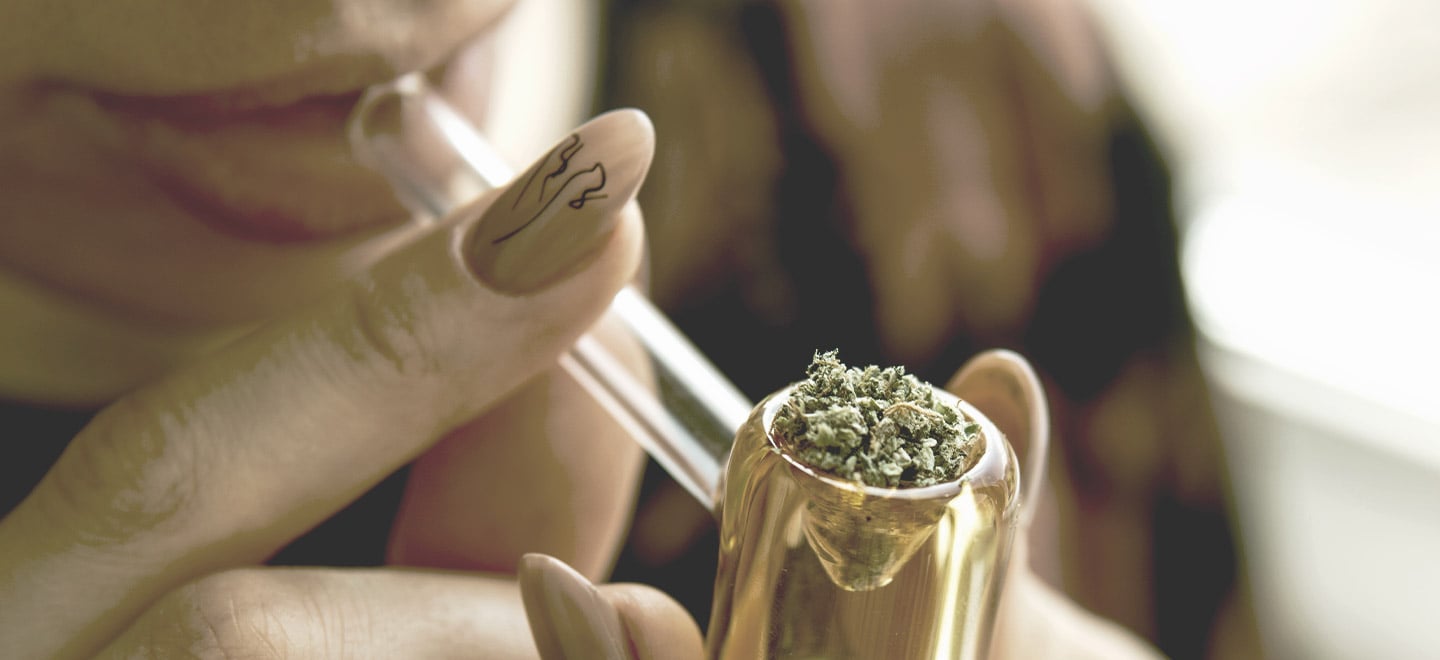
-
Amount of Weed Consumed
The amount of weed you smoke or eat during the same session will also change the length of the high. In many ways, the amount of cannabis you consume supersedes the strength of each bud.
One bowl of potent weed with a THC content of 25% will keep you toasted for a while. But smoking blunt after blunt of moderate strength cannabis will blast you higher and keep you there for longer.
Every time you take a hit, THC enters the bloodstream through the alveoli of the lungs. Soon after, it passes through the blood-brain barrier and begins to latch onto CB1 receptors in the brain.
The psychoactive molecule lights up these receptor sites, which leads to a temporary shift in how your brain sends and receives neurotransmitters. The more THC you inhale, the more receptors you'll activate. When your smoke sessions last for several hours, you'll keep your CB1 receptors engaged and prolong the psychoactive effect.
-
Method of Consumption
There are three main routes of administration when it comes to consuming THC. All of them involve slightly different pathways in the body and therefore offer a different rate of onset and duration.
⇢ Smoking/vaping: Offer a rapid onset, with total effects lasting between 30 and 60 minutes (but can be much longer depending on other variables).
⇢ Edibles: Take up to 1 hour to take effect. The intense high usually lasts between 4 and 6+ hours.
⇢ Sublingual: Sublingual ingestion refers to placing a cannabinoid-infused oil under the tongue and holding it there. This allows THC and other molecules to diffuse into the capillary bed under the tongue, bypassing the digestive tract. Immediate access to the bloodstream means sublingual cannabis shares a similar onset and duration to smoked or vaped cannabis.
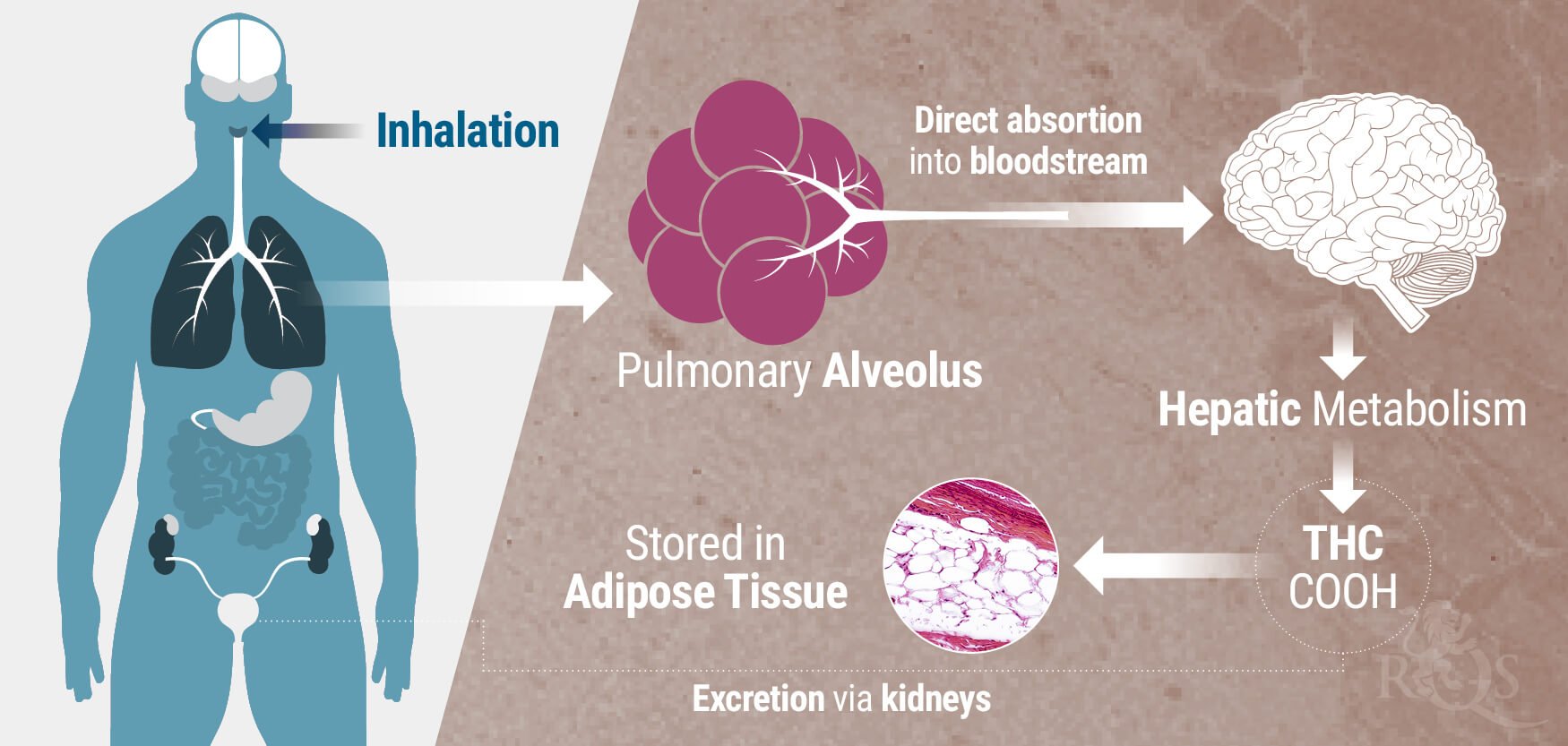
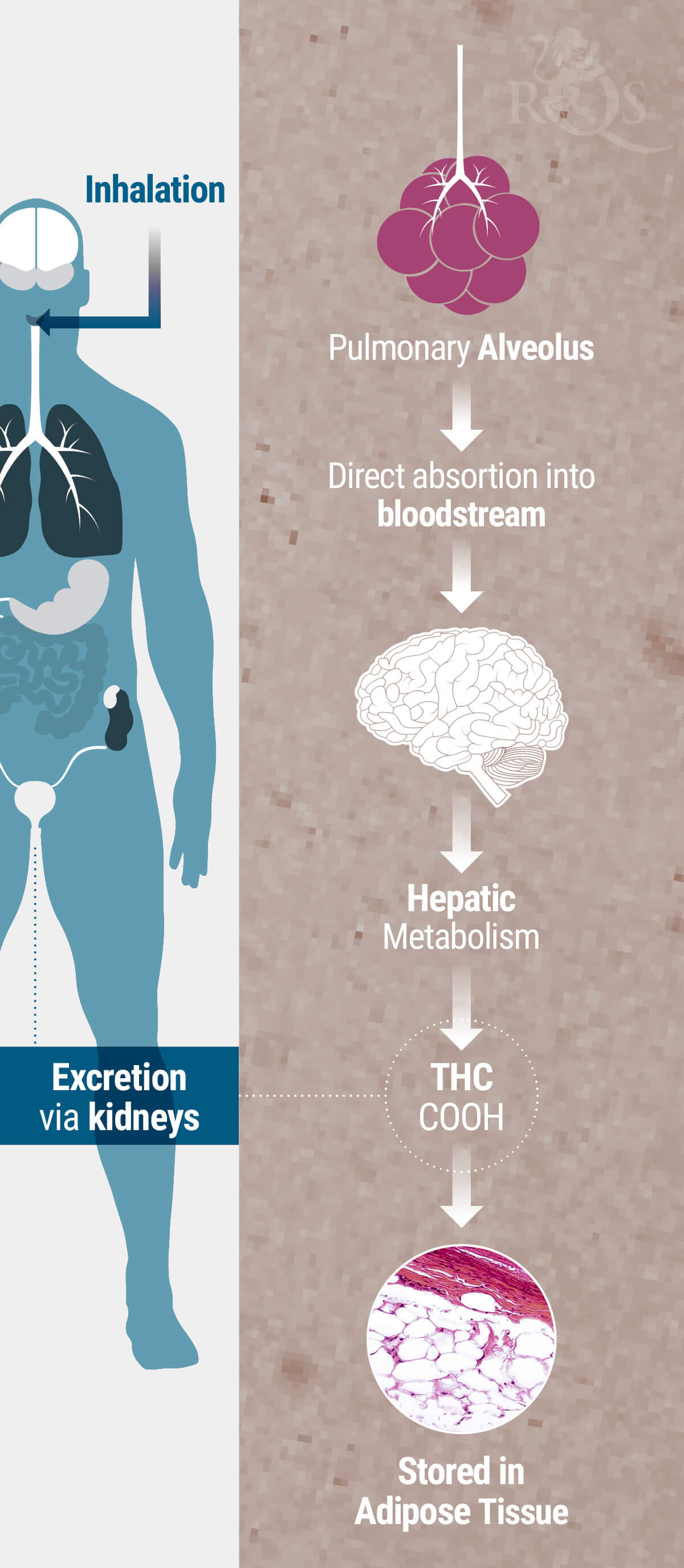
-
Tolerance
The body adapts to the amount of cannabis you consume over time. If you pass a novice smoker and an experienced smoker the same bowl of weed, they'll both experience very different effects.
The novice will feel much higher for a longer period of time, whereas the experienced user might ask for another hit five minutes later.
But why does the same amount of weed produce different effects in both people? Well, the experienced smoker has developed a tolerance to THC.
After long term exposure to THC, the brain decides to reduce its number of CB1 receptors. Because THC creates its effect by binding to this site, the fewer CB1 receptors that are available, the more THC it takes to diffuse out and reach these sites.
In contrast, the novice's brain features CB1 receptors all over the place. It only takes a small amount of THC to pass through the brain before the molecule comes across one of the many landing sites available to produce an effect. For those who smoke a lot, this is not irreversible. A tolerance break can have you feeling fresh and like a novice smoker again in no time.
-
Metabolism
Everybody possesses a slightly different metabolism. Put simply, the word "metabolism" describes the chemical processes in the body that use up energy and burn calories.
We all have that friend with a monumental appetite that never seems to put on weight. These people possess a fast metabolism capable of using energy quickly. Our metabolic rate can also impact how long a cannabis high lasts.
Somebody with a faster metabolism can clear THC from the system quicker than somebody with a slower metabolic process. This becomes particularly impactful when it comes to edible cannabis.
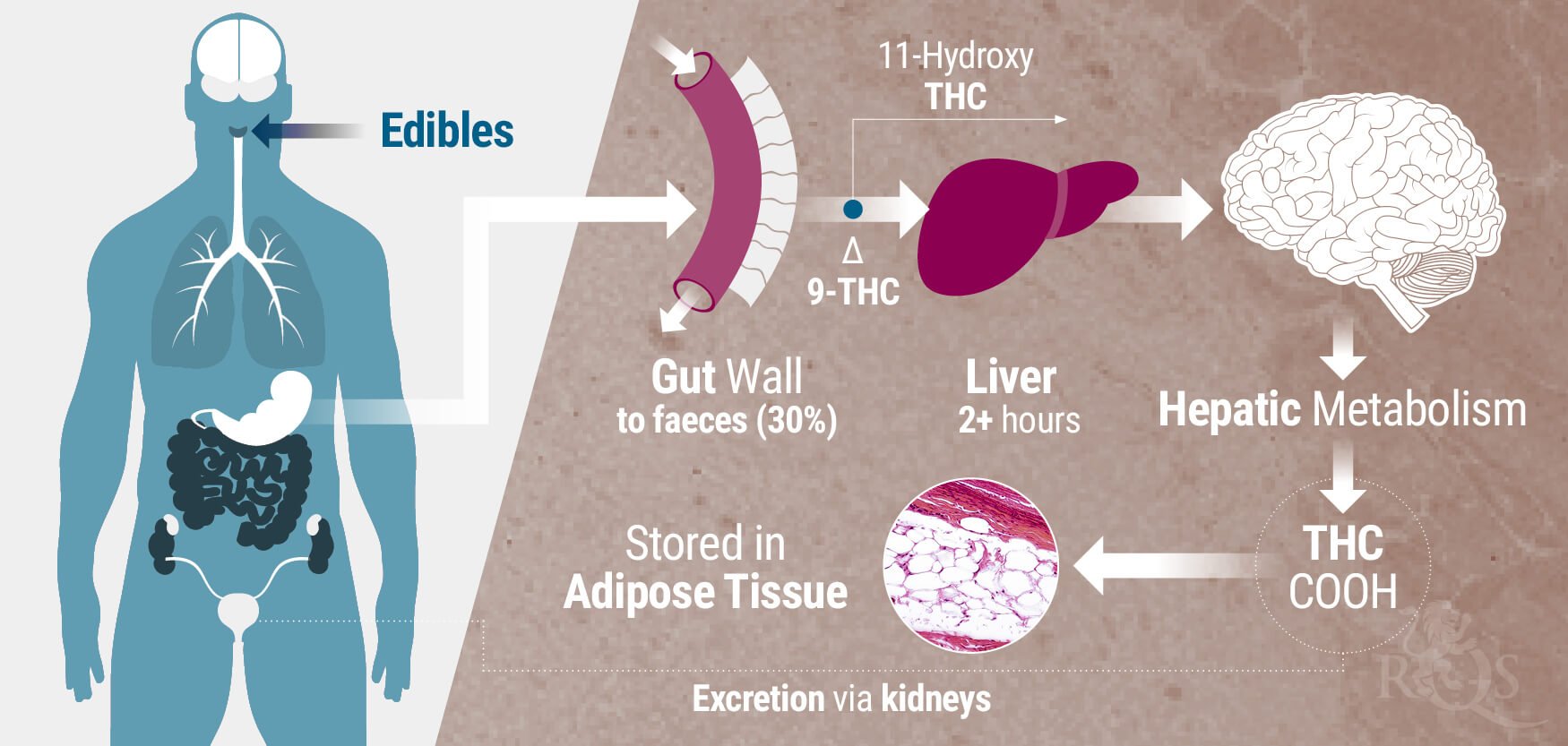
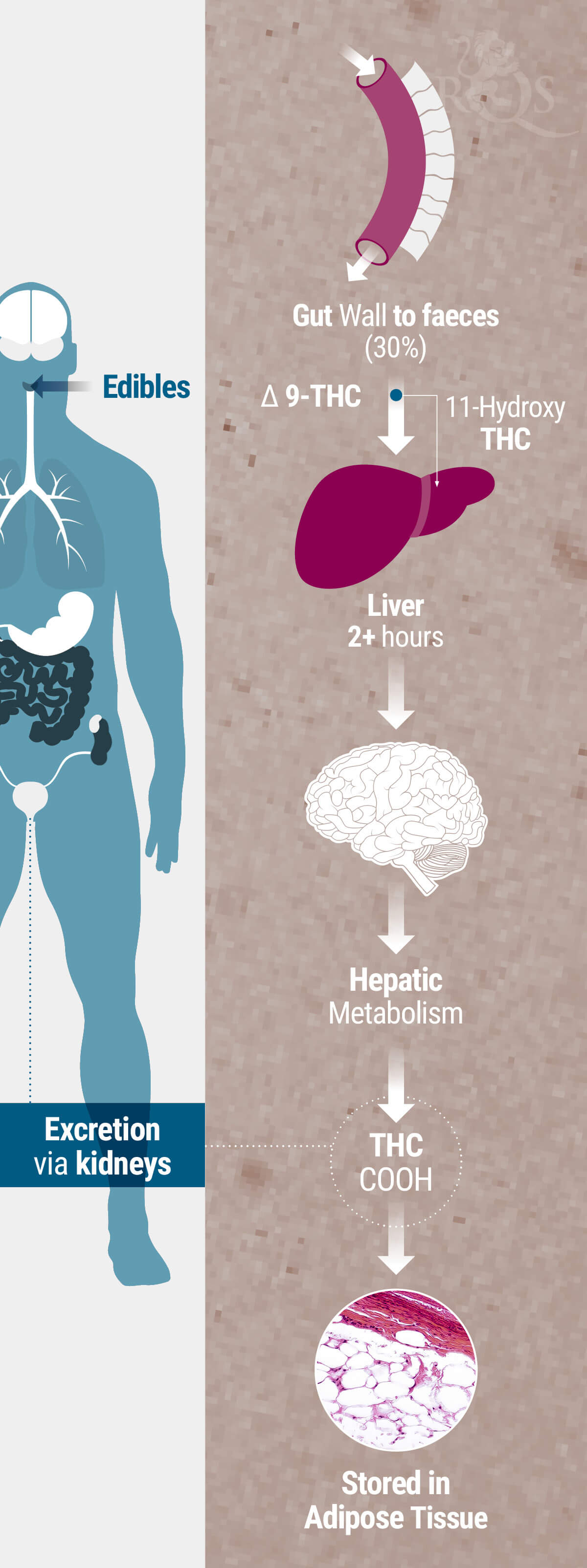
-
Age
Very little evidence points towards age as a factor that influences the duration of a cannabis high. However, tolerance can increase with age if a person smokes frequently. An older person with an increased tolerance will likely experience highs of shorter duration, especially if smoking relatively weak flowers.
-
Height and Weight (Mass)
Height and weight have little effect on the high/psychoactive effects of cannabis. Most of the action occurs in the brain, so body mass and height don't really dictate too much.
However, somebody who is overweight partly due to a slow metabolism may experience drawn out effects when consuming edibles. Their bodies may process cannabis slower, resulting in a slightly extended experience.
How Long Will My Cannabis High Last?
The way you consume cannabis will impact the duration of the high more than any other factor. Explore the general timeframe for each route of administration below. Then, discover methods to extend your high when you're having a good time, or ways to cut it short if you want it to end.
-
Smoking & Vaping
Smoking joints and blunts or hitting vapes delivers a swift dose of THC into the bloodstream. The effects of smoking peak after 10 minutes and last anywhere between 1 and 3 hours, depending on other variables.
Even after the obvious effect wears off, you can still expect an "afterglow" to linger for up to 6–8 hours after taking that first hit.

-
Edibles
Edible takes a very different route in the body. THC must pass through the throes of the digestive tract and liver before entering the brain and firing up CB1 receptors. You can expect to wait around 30–60 minutes before you start to feel anything.
Once the effects take hold, get ready to endure a powerful and almost psychedelic high for the next two hours as the effects peak. Then, you'll ride out the comedown for at least another four hours.
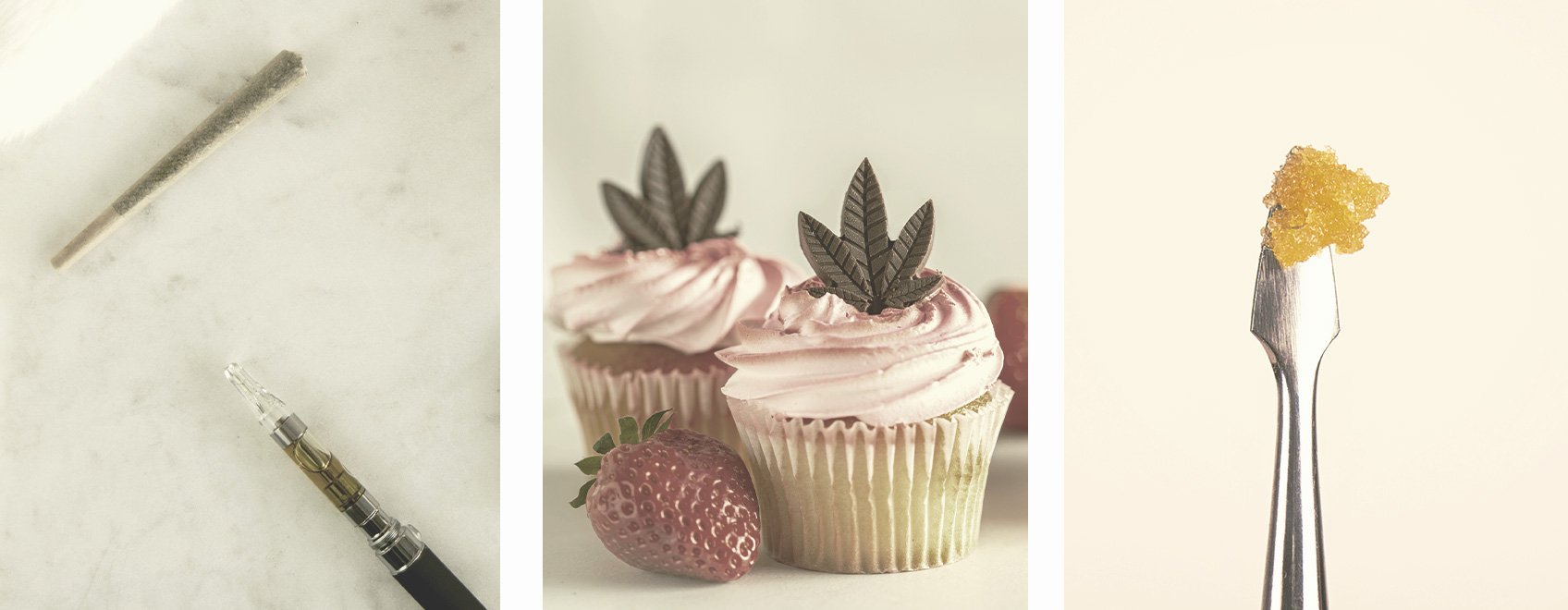
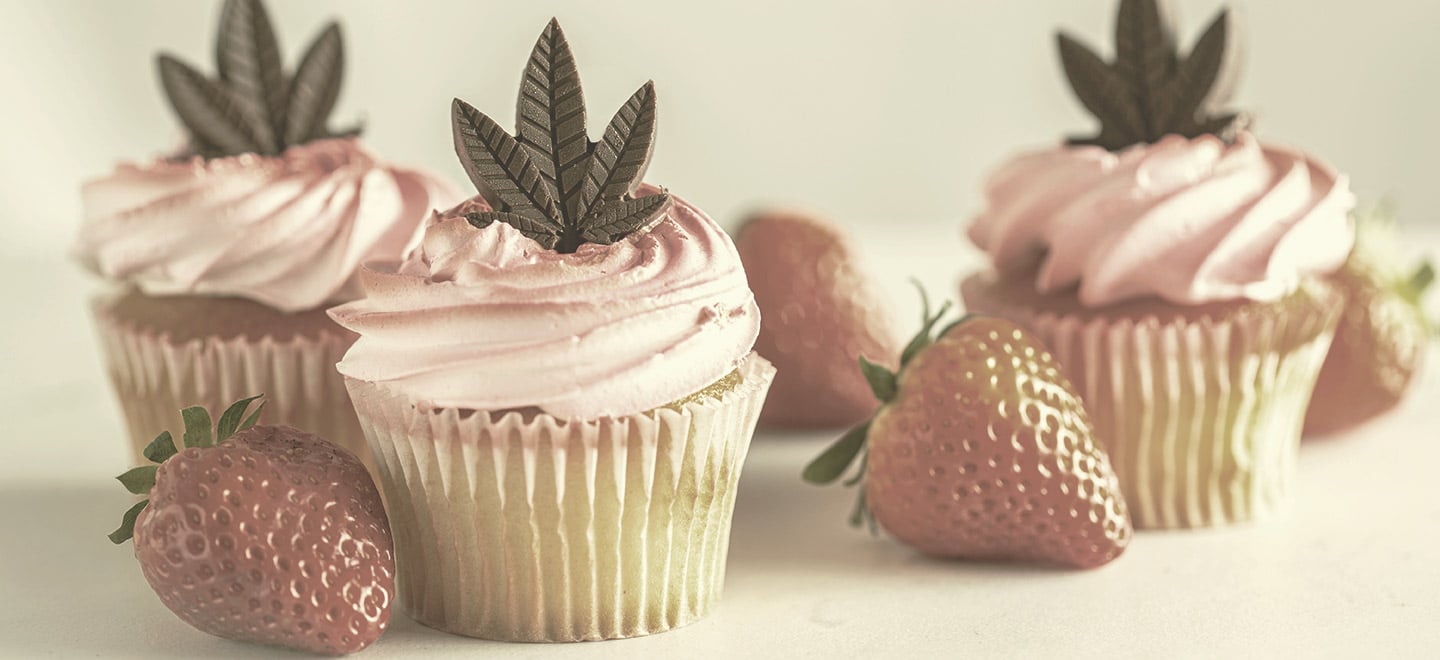
-
Concentrates
Concentrates such as hash and dabs are inhaled through dabbing rigs, vapes, or bongs. These preparations produce a longer-lasting effect than raw flowers, as they deliver a much more concentrated hit of THC. Expect the effect to peak during the next 10 minutes. You'll stay elevated for the next 2–3+ hours.

How To Make a Cannabis High Last Longer
Some cannabis users employ different methods to extend their high. When you're having a blast with friends, sometimes you just don't want to come back down. Check out these tips to make your high last longer:
| Stick with edibles |
Edibles will keep you high for hours longer than inhaled weed. Just be prepared for a more intense and introspective experience. It can also be harder to dose edibles as getting an even distribution in food can be tricky. |
|
Eat some mango |
Although we don't have evidence to back up this claim, many cannabis users report that a slice of fresh mango keeps them baked for longer. This tropical fruit contains myrcene, a terpene found in cannabis that exerts a stoning and relaxing effect. |
| Sip on some beer |
Many don't like to mix these two. However, if you're smart about it, you can harness the power of a good beer to make your high last longer. Research shows that alcohol may improve the absorption of THC[1]. Remember, take things one sip at a time to avoid overdoing it. |
| Stick with edibles |
|
Edibles will keep you high for hours longer than inhaled weed. Just be prepared for a more intense and introspective experience. It can also be harder to dose edibles as getting an even distribution in food can be tricky. |
| Eat some mango |
|
Although we don't have evidence to back up this claim, many cannabis users report that a slice of fresh mango keeps them baked for longer. This tropical fruit contains myrcene, a terpene found in cannabis that exerts a stoning and relaxing effect. |
| Sip on some beer |
|
Many don't like to mix these two. However, if you're smart about it, you can harness the power of a good beer to make your high last longer. Research shows that alcohol may improve the absorption of THC[1]. Remember, take things one sip at a time to avoid overdoing it. |
How To Cut a Cannabis Higher Shorter
Sometimes it helps to cut your high short. Whether you need to get to work, or you're getting a bit panicky, these tips can help you bring your high to a premature end:
| Black pepper |
If you feel panicky, try chewing on a couple of peppercorns. If you can handle the spice, compounds within black pepper can help to take the edge off your high. The spice contains high levels of caryophyllene. Research shows this terpene exerts a relaxing effect[2] that can help with nervousness and agitation. |
|
Pine nuts |
These delicious snacks contain high levels of the terpene pinene[3], which may help to relax an overthinking mind. |
| CBD |
This non-psychoactive cannabinoid may help to bring your high back down to Earth quicker. CBD is thought to blunt the peak of a THC high. |
| Lemon peel |
Lemon peel also contains relaxing terpenes that create a tranquil and refreshing effect. Simmer some lemon peel into a tea for a relaxing brew alongside your joint if you're prone to bad experiences. |
| Black pepper |
|
If you feel panicky, try chewing on a couple of peppercorns. If you can handle the spice, compounds within black pepper can help to take the edge off your high. The spice contains high levels of caryophyllene. Research shows this terpene exerts a relaxing effect[2] that can help with nervousness and agitation. |
| Pine nuts |
|
These delicious snacks contain high levels of the terpene pinene[3], which may help to relax an overthinking mind. |
| CBD |
|
This non-psychoactive cannabinoid may help to bring your high back down to Earth quicker. CBD is thought to blunt the peak of a THC high. |
| Lemon peel |
|
Lemon peel also contains relaxing terpenes that create a tranquil and refreshing effect. Simmer some lemon peel into a tea for a relaxing brew alongside your joint if you're prone to bad experiences. |
Cannabis High: Take It at Your Own Pace
There you have it. By changing the way you consume cannabis, you can alter the duration of your high. Of course, you should also consider other variables, such as your personal tolerance and metabolism.
You can use these factors to estimate how long you'll stay high, and you can also use the tips above to attempt to extend or reduce the duration of your experience.
At the end of the day, it's all about being as high for as long as you find comfortable. Play around with different strain, potencies, and routes of administration until you find your personal sweet spot.
Promoting Responsible Cannabis UseRQS emphasizes the importance of responsible cannabis consumption.
While many individuals use cannabis frequently without complications, some may be susceptible to developing adverse behaviours. We believe the herb should enhance one’s life, not hinder it.
Responsible use involves limiting consumption to adults only, refusing to operate cars or machinery while under the influence, and making an effort to resist abuse.
Stay Cultivated.
- Ethanol increases plasma Delta(9)-tetrahydrocannabinol (THC) levels and subjective effects after marihuana smoking in human volunteers - PubMed https://pubmed.ncbi.nlm.nih.gov
- β-Caryophyllene, a CB2 receptor agonist produces multiple behavioral changes relevant to anxiety and depression in mice - PubMed https://pubmed.ncbi.nlm.nih.gov
- Taming THC: potential cannabis synergy and phytocannabinoid-terpenoid entourage effects https://www.ncbi.nlm.nih.gov


























